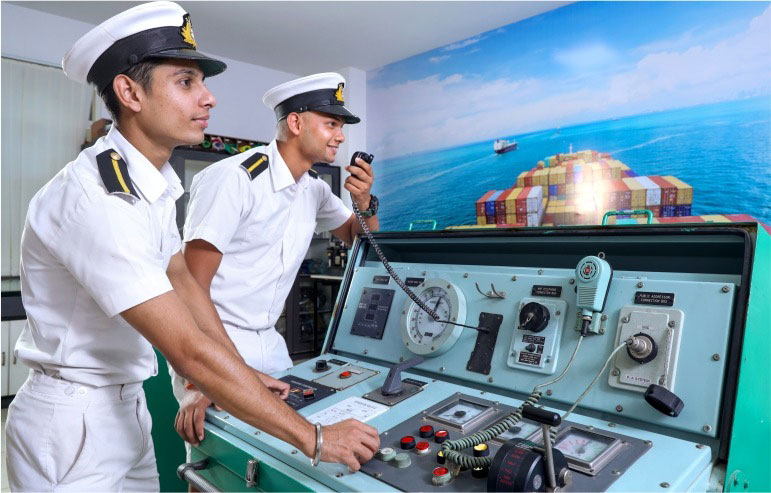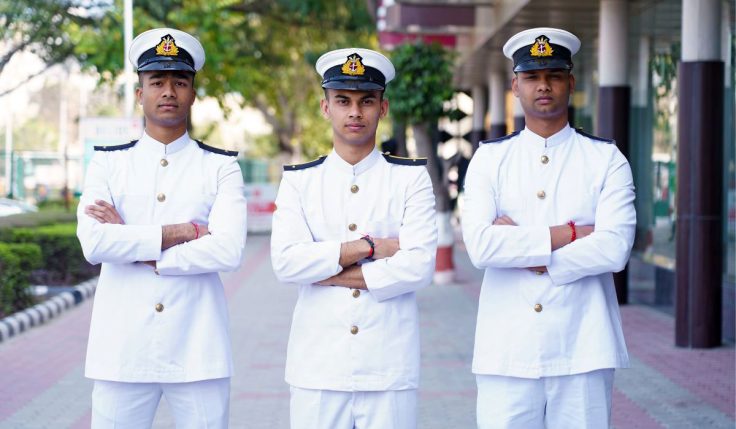Handling cargo, determining ship direction, doing ship repairs, cleaning the ships, learning about different cultures, etc. This is the main focus of a merchant navy officer’s life. You can study a B.Sc. in nautical science, marine science, marine catering, at Chitkara University if you want to enlist as a cadet.
The cadets are sent to ships for training for around 18 months after completing pre-sea training. The cadets may scatter over several ships for breaks in between sessions. A 15–40k stipend is given to cadets. Following their training, individuals are qualified to take the competence test offered by the Indian government. You can join the ship as a third officer after passing this exam. Cadets advance in position with on-the-ship experience and a few exams. The longest time required to become a captain of a ship is typically 11 years.
Following their training, individuals are qualified to take the competence test offered by the Indian government. You can join the ship as a third officer after passing this exam. Cadets advance in position with on-the-ship experience and a few exams. The longest time required to become a captain of a ship is typically 11 years.
You’ll start out as a Junior Engineer or Cadet. Third Engineer, Second Engineer, and Chief Engineer round out the list of jobs. As you gain experience at sea and pass numerous examinations administered at each level, you will advance in your job. They maintain the engine, boiler, generator, etc. and guarantee that every piece of equipment on the board is in good operating order.
You should acquire a bachelor’s degree in one of the following fields if you want to work as an engineer:
- Marine Engineering
- Naval Architecture and Offshore Engineering
- Petroleum Engineering
- Mechanical Engineering
- Harbour & Ocean Engineering
- Civil Engineering
- Electrical & Electronics Engineering
The industry has a wide range of potential applications, and the Merchant Navy is among the most profitable professions. There are many distinct sorts of ships, each carrying a different kind of cargo. They can work in a field that interests them or that is available on the market.
Cadets start up making between $40k and $50k. The upkeep of the ship is often the cadet’s responsibility, and they aid the officers in their work. Their pay would increase to between 90k to 1,20,000 after finishing the sea time, competence testing, and joining the ship. Similar to this, the starting salary for engineers is roughly $50,000 and can go to $100,000 or more.
Engineers handle the technical problems and are in charge of maintaining the ship’s functionality. Although the remuneration for the various firms varies, gas tankers often pay 20–30% more.
The main skills required for pursuing a career in Merchant Navy are:
Leadership:
People who choose a career in the merchant navy should have strong leadership qualities, as one day the officer will be the ship’s captain and will be looked to for both major and minor choices. A good leader must be trustworthy, able to delegate, self-assured, and have a positive attitude on all issues. Businesses may use leadership tactics to influence and motivate their workforce, as well as help employees build their confidence. A crucial element in employee motivation is providing them with the resources and skills they need to succeed, good performance feedback, and recognition.
Communication Skills:
People who choose a profession in the merchant navy collaborate with many teams offshore. In order to avoid misunderstandings that can lead to unintended consequences in the future, it is crucial to convey the correct message. Effective communication is necessary to ensure that everyone is on the same page. Businesses are affected by workplace communication because it enhances their ability to compete and run effectively. If employees can communicate inside the workplace, their productivity and commitment will increase.
Critical Thinking and Decision Making:
Off-shore issues might occur at any time, thus it’s crucial for a military officer to have critical thinking abilities to navigate around them. A merchant navy officer must be able to reason clearly and reasonably and comprehend how concepts are related logically. By enhancing your decision-making behaviours to the point of a conscious and intentional choice, clear thinking increases your decision-making abilities. When fully grasped, logic and reasoning provide you the power to decide what you will think and do in every area of your life.
India has built up a sizable capacity for teaching the merchant navy in a classroom, but there remained a significant barrier to offering onboard ship instruction to the students enrolled in a classroom setting. The huge step was made possible by the shipping ministry’s requirement that these colleges set up on-board ship training programmes as well.
A change in policy has also been implemented to make training institutions accountable for the students’ onboard ship training in addition to their classroom instruction. It has been agreed to let officers and ratings to get on-board training aboard tugs and offshore vessels as well, freeing up additional slots for on-board ship training.
Chitkara University supports this initiative and aspires to bridge the gap between practical and theoretical knowledge through its B.Sc Nautical Science and Maritime Engineering courses.






